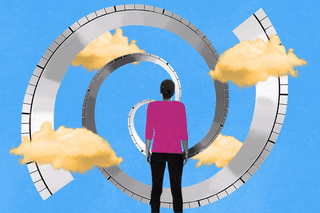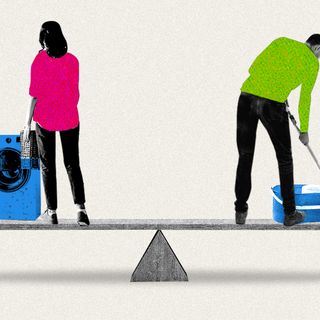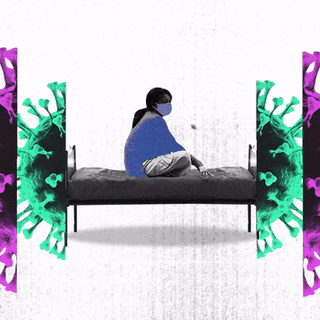
Will We Ever Get Our Attention Span Back?
Hint: it’s possible, but we’ll have to fight for it.

In the late 19th century, psychologist William James spoke of a simple truth: “My experience is what I agree to attend to.” He was among the first to infuse the idea of choice into the rather abstract notion of “focus.”
But James’s treatise on attention feels outdated in the current age of the attention wars. Our time and thoughts are no longer our own, with capitalism and technology having long commodified even the most atomic detail.
Mansha, for instance, often finds herself doing something… and then suddenly nothing. Tracing back her steps, it would begin with something she wanted to do, like work or reading. Then a casual glance at the phone, a #healthysnacks post that brings to mind the prospect of dinner, a meal with a lost friend from a bygone era, stalking the friend on Instagram to see what they’re up to, all with Fleetwood Mac’s “Go Your Own Way” playing in the background, perhaps to commemorate a forgotten friendship. How did she get here? What was she looking for? It was a trajectory of chaos. Many people today find themselves unable to completely watch a 90-minute-long movie, listen to a podcast, read a book; the tabs housing half-read essays keep growing in number (perhaps this article shall be one of them). Not because they don’t want to but because they can’t. There is always something more obvious vying for our focus.
An ever-diminishing attention span is our permacrisis today; our focus remains divided, non-committal, and vulnerable to being weaponized. The attention crisis banks on “the invasive logic of commercial social media and its financial incentive to keep us in a profitable state of anxiety, envy, and distraction,” as author Jenny Odell put it in her book. Our minds feel amorphous, looking here, there, everywhere, without the ability to process and rationalize.
Individually, the fight for attention becomes a fight for agency and ownership. Collectively, it becomes the only way to fight an information overload unlike any other in the history of humanity. The question then asks itself: Will we ever get our attention span back?
***
There’s something very transactional about the way we frame our time and thoughts – stripping the idea of control James spoke of. In this “attention economy,” we must “transact” our time and “pay” our attention to things – our attention becomes a currency everyone has free reign to trade on. Companies are “harvesting” our attention; this is an age of attention “scarcity”; someone is “stealing” our attention. There is “clickbait” or “doomscrolling,” which again position individual and collective attention as an ongoing struggle.
“Framing definitely affects our thoughts, it affects our decisions, and how we talk to ourselves,” says Sadaf Vidha, a clinical psychologist. “Those thoughts about ourselves do influence what we do, how much we take care of ourselves, if and how we set boundaries.”
And when our language in itself tells us that attention is something we must give away, our minds, relationships, and ideas are all left in disarray. The capitalist project is complete: we’re conditioned into thinking our time is not our own.
“Oftentimes, I feel like my attention is not really mine,” Kashish, 20, says. It belongs to someone else, or worse, it belongs in the marketplace.
Related on The Swaddle:
Social Media Is Shaping Our Memory of Wars, Pandemic. What Will That Mean for History?
In his book, The Attention Merchants, Tim Wu speaks of “attention harvesting” to define how industrialists and social forces reap people’s time and energy for profit. Now, the means of getting “inside” our heads are becoming unimaginably diverse, including cognitive channels and social and political conduits.
“The attention economy may imply fair trades within a teeming marketplace, people empowered as life’s producers as well as its consumers,” Megan Garber wrote in The Atlantic. But we know the economy is devised to feed off labor and in return make masses more vulnerable. “Our time and our care belong to us right up until they don’t.” This is where we find ourselves today; our lives are both concrete and crumbling.
“What scares me more is how ignorant I was about all of this – that so much of my behavior, my psyche, my actions, my words – is deeply rooted in a capitalist market system’s philosophy,” laments Mansha.
Our language systems then are outdated and rigid; unable to comprehend the ways they catalyze collective disempowerment. The ripple effect is one of guilt, helplessness, and a collective denial of agency.
Attention is linked to productivity; we focus on the things deemed most important by socio-economic metrics of functioning. “I would agree,” Kashish adds. “It’s as if your worth is constantly being gauged by how long you can pay attention to something.”
When many things “demand” our attention, “there is a sense of a scattered feeling — like not feeling collected enough,” Vidha explains. “One of the things that happens when you’re very distracted is that your attention is pulled in too many directions. And it does not allow for you to ever deeply understand anything.” Always being split, then, taps into the double insecurity of not being “productive” enough and not being present enough.
“That makes me feel like I’m trapped in this system – either by technology or capitalism,” Mansha says.
***
In Attention: a poem for Sunday, author Leila Chatti wrote beautifully but heartbreakingly: “All day, the world makes its demands. There’s so much of it, world, /begging to be noticed.” Everything demands a raucous sense of acknowledgment; “to each thing I say Yes? Yes!—zealot of whatever calls me next.”
Can language ever adapt? Arguably, the whole lexicon anchored in the attention economy “just reflects the reality of our lives,” as Sadaf puts it. And it’s incredibly important that language reflects what is happening in reality. “Right now, there are companies that legitimately give you something for free, because you’re giving them your attention.”
Related on The Swaddle:
But language can also be a way to afford us the dignity of choice. The more linguistically arduous route may involve pushing ourselves to critique the way we think about our focus — in order to heal it. Ethicist James Williams, in the book Stolen Focus: Why You Can’t Pay Attention—And How to Think Deeply Again, suggests a paradigm of resistance. He defines attention as a three-tiered hierarchy. “Spotlight” attention is what we need for everyday tasks; “starlight” attention is the focus we need for long-term goals. It is the third layer that offers time and words to think of attention as our own. Called “daylight,” this layer implies mindfulness and forces the person to focus on oneself – with the metaphorical luminescence of the sun. “It’s how you know what you want, and why,” explained author Johann Hari.
If we’re programmed to think of attention in a one-dimensional, transactional sense, these layers of light add more complexity, individuality, and perspective to the “digital dungeon,” as some call it. They connect the attention of the present with that of the future. “Starlight might help me to navigate just a little bit better. Do I want to spend a portion of my one wild and precious life considering the sartorial choices of candy? Maybe so, but at least I can make that decision consciously,” Hari noted. “Distraction in the short term is also distraction in the long. Starlight cannot orient you if you’re forever failing to look up for it.”
In other ways, by thinking of attention as something tiered, we may find ourselves consciously carving space for ourselves, our thoughts – eliminating guilt in the process. We focus on attention in itself; we detach it from chaos, and through it, seek insight robust enough to critique the status quo. If attention is like a kaleidoscope, the reflecting images would then be of self-awareness. I wish, Mansha says, there was “a word that removes the element of guilt – that allows you to articulate attention with the idea of individual agency, that I decide where my focus leans towards.”
This ability to decide is an act of reclamation. Distractions don’t always have to be the Wicked Witch of the West; sometimes, rabbit holes can inspire creativity or spark curiosity. We don’t have to shun distractions as a concept. The question then is not where our attention goes – but who uses it, how it isused. Defiance doesn’t have to mean changing one thing or the other — but that one has the agency to make a choice.
“I think how you use attention is upon you,” Vidha agrees. There is no one answer; agency comes when attention is tailored to the individual, not the market. “People can start very small,” Vidha says, because when all is said and done, “it’s an individual against a structural problem.”
Finding resistance in our speech also shifts the burden of change from the individual to the collective. Arguably, individual abstinence from distraction – reducing screen time, leaving social media – makes for a patchwork solution. It won’t work “for the same reason that wearing a gas mask for two days a week outside isn’t the answer to pollution,” Johann Hari wrote in The Guardian. “It might, for a short period of time, keep certain effects at bay, but it’s not sustainable, and it doesn’t address the systemic issues.”
In his book, Wu wrote, “we must first acknowledge the preciousness of our attention and resolve not to part with it as cheaply or unthinkingly as we so often have.” And then, Wu submits, is the time for action; “individually and collectively, to make our attention our own again, and so reclaim ownership of the very experience of living.”
To Kashish, this whole matter of finding something she lost sounds outlandish, but there is a twinkle in her eye. “It feels liberating to even consider such a possibility.”
Saumya Kalia is an Associate Editor at The Swaddle. Her journalism and writing explore issues of social justice, digital sub-cultures, media ecosystem, literature, and memory as they cut across socio-cultural periods. You can reach her at @Saumya_Kalia.
Related


Partners Tend to Divide Chores – But Sharing the Same Tasks Could Be Healthier
